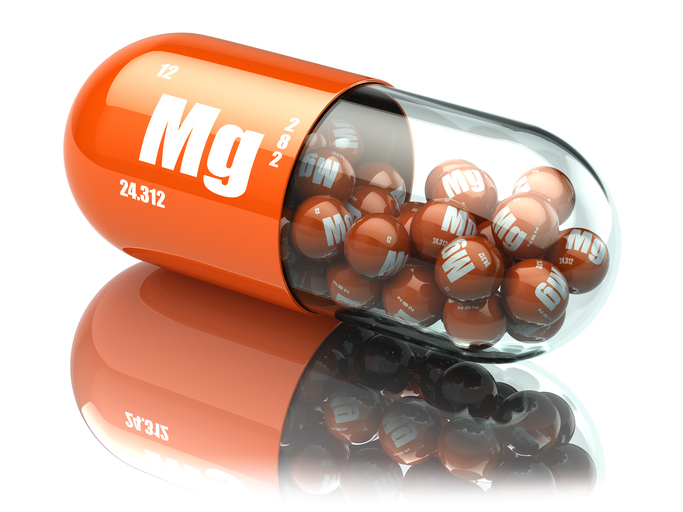Magnesium Citrate or Magnesium Glycinate?
Magnesium deficiency, or sufficiency, is difficult to ascertain, as measuring magnesium levels is not as straightforward as a simple blood test: magnesium is present in bones and cells rather than in the bloodstream. Nonetheless, the Office of Dietary Supplements, a division of the National Institutes of Health, warns that too little magnesium can result in muscle cramps and weakness and irregular heartbeats, as well as the loss of appetite and nausea.
Currently there is no data regarding the precise number of Americans who are magnesium-deficient, but data collected by the National Health and Nutritional Examination Survey between 2005-2006 led to the conclusion that older adult men (over the age of 71) and adolescent females are more likely to have low levels than other segments of the population, based on their reported dietary intake.
Recommended daily doses of magnesium vary by age and gender. According to the latest fact sheet published by the National Institute of Health, the recommended daily dose ranges between 400-420 milligrams per day for men and 310-320 for women.
Magnesium is a mineral of abundance, ideally found in plentiful supply in our bodies and in the foods we eat. Magnesium-rich foods include green leafy vegetables such as spinach and Swiss chard, whole grains, avocados, nuts, beans, legumes, and brown rice. Sometimes magnesium is added to food, such as breakfast cereals. According to the USDA’s Nutrient Database, the most magnesium-rich food is crude rice bran.
Sometimes, the body needs a little more magnesium than it is getting naturally, and people may turn to magnesium supplements. Magnesium supplements, however, are not created equally. If you’ve been advised that your body could use extra magnesium, or if you are trying to address a problem such as constipation or muscle cramps, you will need to distinguish between magnesium citrate and magnesium glycinate. Both of these minerals can be found in over the counter supplement form.
Magnesium Citrate
Chemically, magnesium citrate is a blend of citric acid and magnesium in salt form. Magnesium citrate has several delivery methods, either via liquid or tablet and can be found in non-prescription strength at any drug store. Generally, magnesium citrate should be taken on a full stomach, followed by plenty of water.
The supplement is often used medicinally as a laxative for the relief of occasional constipation, as it can increase the amount of water in the intestines and stimulate the bowels. For this reason, it is referred to as an osmotic, or saline, laxative, In fact, if you’ve ever had a colonoscopy, there’s a chance you’ve taken a large dose of magnesium citrate to clean out your system before the procedure.
Like any over the counter laxative, it can also have the side effect of producing diarrhea or other symptoms of an upset stomach, such as bloating or cramping. It tends to work rather quickly once it is ingested, within an hour for some people, or up to about six hours for others.
Magnesium citrate generally should not be taken for longer than a week unless a healthcare professional advises otherwise, though it is non-addictive as well as gentle on the system.
Magnesium Glycinate
Chemically, magnesium glycinate is the magnesium salt of glycine; glycine is the simplest possible amino acid.
Unlike magnesium citrate, magnesium glycinate is not used specifically for constipation. On the contrary, magnesium glycinate is known to be fairly gentle on the stomach, though temporary gastrointestinal symptoms have occurred in some users.
And unlike other forms of magnesium, magnesium glycinate is highly absorbable in the body and does not cause major side effects. However, it may be contraindicated in people with pre-existing kidney issues.
Although it is widely used to alleviate and prevent muscle cramps, taking magnesium glycinate supplements may be beneficial for a range of other health issues. It has been linked to a decrease in blood pressure and may lower the risk for Type 2 diabetes as well as osteoporosis. It also may help with depression and reducing the incidence of migraines.
As is true with any supplements, it is advisable to check with your health care provider before starting a regimen of magnesium.
References
https://ods.od.nih.gov/factsheets/Magnesium-HealthProfessional/#h5
https://ods.od.nih.gov/factsheets/Magnesium-HealthProfessional/#h5
https://ndb.nal.usda.gov/ndb/nutrients/report/nutrientsfrm?max=25&offset=0&totCount=0&nutrient1=304&nutrient2=&subset=0&sort=c&measureby=g
https://www.medicalnewstoday.com/articles/315372.php

Hilary Daninhirsch is a Pittsburgh-based freelance writer. A former lawyer, she lives with her husband, two redheaded teenage daughters, and a needy terrier. When she’s not writing, she’s probably reading or cheering on one of her daughters at a gymnastics meet or on a stage. Hilary’s online portfolio can be viewed at hilarydaninhirsch.journoportfolio.com



